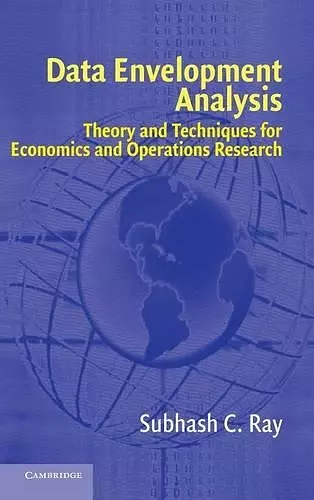Data Envelopment Analysis
Theory and Techniques for Economics and Operations Research
Format:Hardback
Publisher:Cambridge University Press
Published:7th Jun '04
Currently unavailable, and unfortunately no date known when it will be back
This hardback is available in another edition too:
- Paperback£47.00(9781107405264)

This book, first published in 2004, explores data envelopment analysis, which measures firms' input-output efficiencies using mathematical programming techniques.
This book, first published in 2004, deals with the method of data envelopment analysis that uses mathematical programming techniques to obtain measures of efficiency of individual forms from their observed input and output quantities. This permits setting up realistic input-output targets for the firms' managers.Using the neo-classical theory of production economics as the analytical framework, this book, first published in 2004, provides a unified and easily comprehensible, yet fairly rigorous, exposition of the core literature on data envelopment analysis (DEA) for readers based in different disciplines. The various DEA models are developed as nonparametric alternatives to the econometric models. Apart from the standard fare consisting of the basic input- and output-oriented DEA models formulated by Charnes, Cooper, and Rhodes, and Banker, Charnes, and Cooper, the book covers developments such as the directional distance function, free disposal hull (FDH) analysis, non-radial measures of efficiency, multiplier bounds, mergers and break-up of firms, and measurement of productivity change through the Malmquist total factor productivity index. The chapter on efficiency measurement using market prices provides the critical link between DEA and the neo-classical theory of a competitive firm. The book also covers several forms of stochastic DEA in detail.
"...none of the books on DEA that are available in the market today examines DEA from an economist's point of view. Subhash Ray's Data Envelopment Analysis is an exception. This book familiarizes the reader with the microeconomic foundations of the various DEA models that are currently available and widely used in the literature. Professor Ray explains the neo-classical production theory behind various DEA models. It is up-to-date and gives an excellent overview of DEA models from both empirical and theoretical points of view. Professor Ray is a leading authority on DEA. Every chapter of the book shows his mastery in the field. I am confident that the researchers at all levels working on DEA will immensely benefit from reading this book." Subal C. Kumbhakar, State University of New York, Binghamton
"Firmly grounded in the economic theory of production, and richly illustrated with a battery of numerical and computer-driven examples, Data Envelopment Analysis achieves both objectives. Professor Ray is a leading researcher in the field, and he has written a valuable book from which scholars and their students will learn a great deal." C.A. Knox Lovell, University of Georgia
"This lucid treatment of data envelopment analysis is the most thorough and extensive available, and unifies economics, operations research, and management science on this topic. The exposition contains plenty for both those wanting a theoretical treatment and for practitioners primarily interested in applications. The comprehensive book fills a critical gap in the literature, and will be highly valued by applied researchers in government, universities, and the private sector interested in measuring economic efficiency and productivity." Dale Squires, National Oceanic and Atmospheric Administration
"Only a deep understanding of the economics of production can provide an Ariadne's thread to find oneas way through the existing literature on efficiency analysis in general and on the DEA method in particular. In this book, Professor Ray offers the reader an enlightening guidance through this maze, thanks to his equal mastery of the economic conceptual foundations of the field and of the mathematical programming techniques that have rendered it widely applicable. The result is a choice of topics that bear on basic aspects of the efficiency issue more than on technical virtuosity. Among these, the way FDH is put in its proper nonparametric production theoretic perspective pleases me most." Henry Tulkens, CORE, Université Catholique de Louvain
ISBN: 9780521802567
Dimensions: 229mm x 152mm x 21mm
Weight: 650g
366 pages